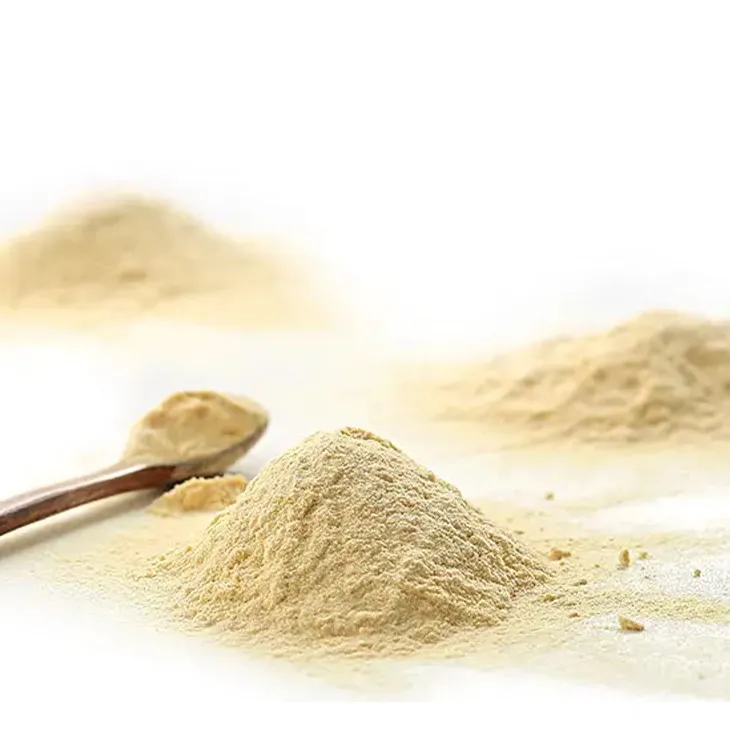- 0086-571-85302990
- sales@greenskybio.com
Selenium Yeast: A Safe and Nutritious Supplement with Global Health Implications
2024-07-04

1. Introduction
In the realm of nutritional supplements, Selenium yeast has emerged as a significant player. Selenium, an essential trace element, is required by the human body in small amounts for various physiological functions. Selenium yeast offers a convenient and effective way to supplement this crucial element.

2. What is Selenium yeast?
Selenium yeast is a form of selenium that is bound to yeast. It is produced through a process where yeast cells are cultured in a medium containing selenium. The yeast then incorporates the selenium into its cellular structure, creating a complex that is highly bioavailable. This bioavailability is one of the key advantages of selenium yeast over other forms of selenium supplements.

3. Safety of Selenium Yeast
3.1 Tolerance and Absence of Toxicity
One of the most important aspects of any supplement is its safety. Selenium yeast has been shown to be well - tolerated by the human body. When consumed within the recommended dosage, it does not pose a significant risk of toxicity. In contrast to some inorganic forms of selenium, which can be toxic in high doses, selenium yeast has a wide margin of safety.
3.2 Compatibility with Other Nutrients
Selenium yeast also exhibits good compatibility with other nutrients. It can be safely consumed along with a balanced diet, including other vitamins and minerals. For example, it has no adverse interactions with vitamin E, which is another important antioxidant in the body. This compatibility makes it a suitable addition to multivitamin and mineral supplements.
4. Nutritional Benefits of Selenium Yeast
4.1 Antioxidant Activity
Selenium is a crucial component of several antioxidant enzymes in the body, such as glutathione peroxidases. Selenium yeast provides the body with the necessary selenium to support the production and function of these enzymes. These antioxidant enzymes play a vital role in protecting cells from oxidative damage caused by free radicals. Oxidative damage has been linked to various chronic diseases, including cancer, heart disease, and neurodegenerative disorders.
4.2 Immune System Support
The immune system also benefits from selenium yeast supplementation. Selenium is involved in the proper functioning of immune cells, such as lymphocytes and macrophages. Adequate selenium levels help these cells to mount an effective immune response against pathogens. Studies have shown that selenium - deficient individuals may have a weakened immune system, making them more susceptible to infections.
4.3 Thyroid Function Regulation
Another important function of selenium is its role in thyroid hormone metabolism. The thyroid gland requires selenium for the conversion of thyroxine (T4) to the more active triiodothyronine (T3). Selenium yeast can help ensure proper thyroid function, which is essential for maintaining a healthy metabolism, energy levels, and overall well - being.
5. Selenium Yeast and Global Health
5.1 Public Health Initiatives
On a global scale, selenium yeast can play a significant role in public health initiatives. In many parts of the world, soil selenium levels are low, leading to selenium - deficient diets in the local populations. By promoting the use of selenium yeast as a supplement, public health authorities can help address this deficiency and improve the overall health of the population. For example, in some developing countries, selenium supplementation programs could be integrated into existing nutrition - related projects.
5.2 Prevention of Selenium - Related Disorders
Selenium - related disorders are more common in areas with low selenium intake. These disorders include Keshan disease, which is a cardiomyopathy, and Kashin - Beck disease, which affects the joints. Selenium yeast supplementation can be an effective preventive measure against these diseases. In regions where these diseases are endemic, the introduction of selenium yeast supplements could potentially reduce the incidence of these debilitating conditions.
5.3 Contribution to Overall Well - being across Cultures
Different cultures around the world have diverse dietary patterns. However, regardless of cultural differences, the need for essential nutrients like selenium remains. Selenium yeast can be incorporated into various traditional diets in a way that is acceptable to different cultures. For example, it can be added to bread in Western cultures or to rice in Asian cultures. This adaptability makes it a valuable tool for promoting global health and well - being.
6. How Selenium Yeast is Assimilated by the Body
The assimilation of selenium yeast by the body is a complex but efficient process. Once consumed, the selenium - yeast complex is broken down in the digestive tract. The yeast component helps in the slow and controlled release of selenium, which is then absorbed through the intestinal mucosa. This form of selenium is more easily assimilated compared to some other forms, such as inorganic selenium salts. The absorbed selenium is then transported to various tissues in the body, where it is utilized for its different physiological functions.
7. Conclusion
In conclusion, selenium yeast is a safe and nutritious supplement with far - reaching implications for global health. Its safety profile, combined with its numerous nutritional benefits, makes it an attractive option for individuals seeking to supplement their selenium intake. On a global scale, it has the potential to improve public health, prevent selenium - related disorders, and contribute to the overall well - being of diverse populations. As research in the field of nutrition continues to evolve, the role of selenium yeast in maintaining health is likely to become even more prominent.
FAQ:
What is selenium yeast?
Selenium yeast is a form of selenium that is bound to yeast. It is a nutritional supplement which provides selenium in a bioavailable form. This means that it can be easily absorbed and utilized by the body compared to some other forms of selenium.
How is selenium yeast safe for consumption?
When taken as directed, selenium yeast is generally safe. It has been studied for its safety profile, and in appropriate doses, it does not typically cause adverse effects. However, like any supplement, excessive intake can be harmful. The safety also depends on factors such as an individual's overall health, pre - existing medical conditions, and other medications or supplements they may be taking.
What are the nutritional benefits of selenium yeast?
Selenium yeast offers several nutritional benefits. Selenium is an essential micronutrient that plays a crucial role in antioxidant defense, helping to protect cells from oxidative damage. It is also involved in thyroid hormone metabolism, which is important for maintaining proper metabolic function. Additionally, it may contribute to a healthy immune system and has been associated with reduced risk of certain diseases.
How does selenium yeast contribute to public health on a global scale?
On a global scale, selenium yeast can have a significant impact on public health. In areas where soil selenium levels are low, people may be at risk of selenium deficiency. Supplementing with selenium yeast can help prevent selenium - related disorders such as Keshan disease (a type of heart disease associated with selenium deficiency). It can also contribute to overall well - being, improving the health of populations in different geographical areas and cultures, and potentially reducing the burden of certain diseases that are related to selenium deficiency.
How does the body assimilate selenium from selenium yeast?
The yeast in selenium yeast acts as a carrier, which helps the selenium to be more easily assimilated by the body. The selenium is incorporated into the yeast cells during the production process, and when consumed, the body can break down the yeast and absorb the selenium in a more efficient manner compared to some inorganic forms of selenium.
Related literature
- The Role of Selenium in Nutrition and Health"
- "Selenium Yeast: A Promising Source of Selenium for Human Nutrition"
- "Global Impact of Selenium Supplementation on Public Health"
- ▶ Hesperidin
- ▶ citrus bioflavonoids
- ▶ plant extract
- ▶ lycopene
- ▶ Diosmin
- ▶ Grape seed extract
- ▶ Sea buckthorn Juice Powder
- ▶ Beetroot powder
- ▶ Hops Extract
- ▶ Artichoke Extract
- ▶ Reishi mushroom extract
- ▶ Astaxanthin
- ▶ Green Tea Extract
- ▶ Curcumin Extract
- ▶ Horse Chestnut Extract
- ▶ Other Problems
- ▶ Boswellia Serrata Extract
- ▶ Resveratrol Extract
- ▶ Marigold Extract
- ▶ Grape Leaf Extract
- ▶ blog3
- ▶ blog4
- ▶ blog5
-
Nutmeg Extract
2024-07-04
-
Aguaje Extract
2024-07-04
-
Mangosteen extract powder
2024-07-04
-
Fig Extract
2024-07-04
-
Uridine-5'-monophosphate Disodium salt
2024-07-04
-
Hedyotis Diffusa Extract
2024-07-04
-
Rosemary extract
2024-07-04
-
Curcuma Longa Extract/Turmeric extract
2024-07-04
-
Kidney Bean Extract
2024-07-04
-
Eyebright Extract
2024-07-04





















